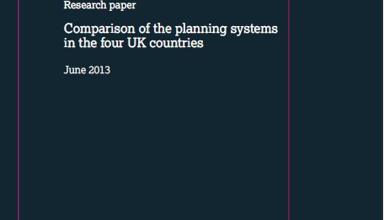The UK Government recently announced its plans to make changes to the Judicial Review process. It argues that the main reason for doing this is to reduce the number of “weak, frivolous and unmeritorious cases” that cause delays, add to costs and slow down growth, which can be a particular concern for planning and infrastructure cases.
Figures from the Ministry of Justice show the number of judicial review applications in England and Wales rose from 7,000 in 2007 to over 11,000 in 2011. However most of this increase was due to immigration/asylum cases. Judicial Review is a final way of challenging planning decisions made by local planning authorities or the Welsh Government. The rules for judicial review are already very restricted and decisions can only be challenged on the grounds of “illegality”, “irrationality” and “procedural impropriety”. The UK Government is pressing ahead with its changes despite the fact that most of the responses received to a consultation on its proposals were opposed to reform. It says that it remains convinced that reform is necessary. The consultation ran for a six week period either side of last Christmas and has been criticised by some as insufficient time for an issue of “great constitutional importance”. Although planning and infrastructure development are mostly devolved matters, the changes to the Judicial Review process will apply in Wales as well as in England. The key changes to be brought in by the summer are:
- Reducing the time limit from three months to six weeks in planning cases.
- For a case where an application for a review is turned down, removing the right to a hearing before a judge if the case is considered to be totally without merit.
- Introducing a £215 fee for those cases that are initially turned down and a hearing before a judge is still held.
The UK Government has also consulted separately on raising fees for Judicial Review cases from £60 to £235 and is planning to announce its intentions shortly. It also believes that there may be scope to further streamline the process of Judicial Review, particularly for infrastructure and housing projects.
Article by Graham Winter National Assembly for Wales Research Service.




